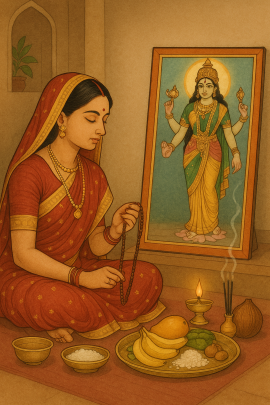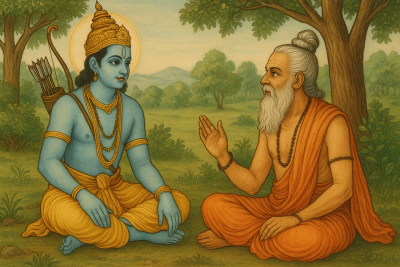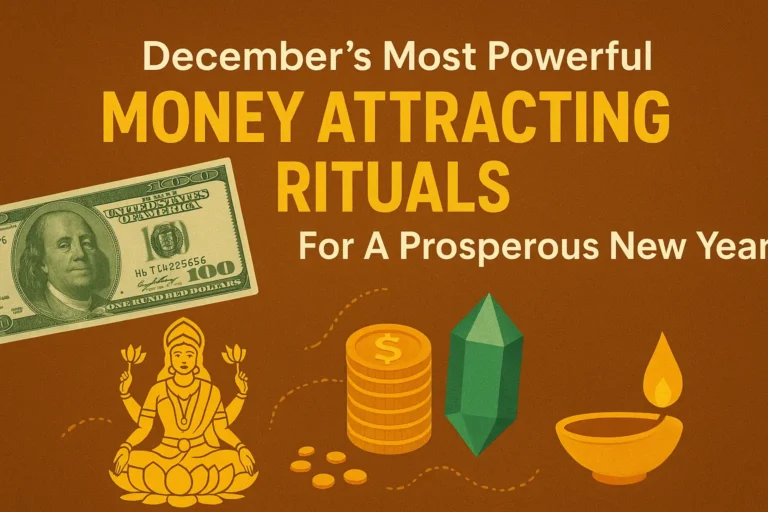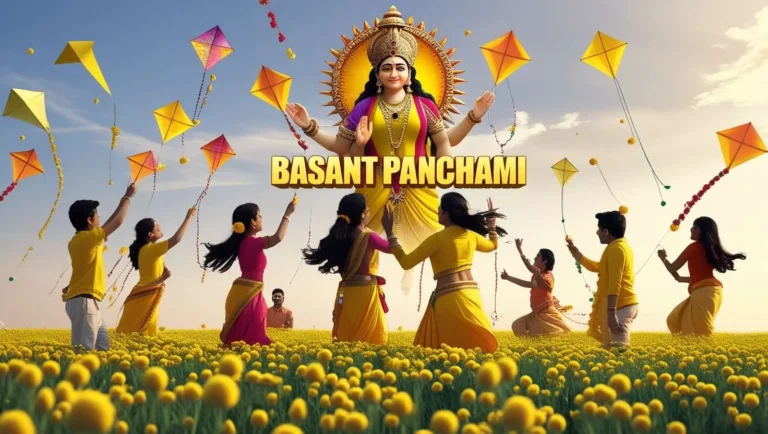
Mohini Ekadashi
Forge Your Best Self
Spiritual insights, rituals, and mindful living
Why do We Celebrate and Observe Mohini Ekadashi
Hindus observe Mohini Ekadashi mainly for spiritual cleansing, purification and liberation from sins and karma. This Ekadashi (11th day) is observed on the Shukla Paksha (waxing moon phase) in the month of Vaishakha (April–May), as per the Hindu lunar calendar.
Significance of Mohini Ekadashi
Devotional Observance (Bhakti): The fasting and prayers are offered to Lord Vishnu, who is said to grant peace, prosperity, and moksha (liberation) to devotees. It is so named after Mohini, the beautiful feminine form Lord Vishnu assumed to share the nectar of immortality (amrita) while churning the ocean (Samudra Manthan).
Spiritual Gains: This Ekadashi is said to cleanse sins, particularly past-life ones. It fosters detachment from worldly desires and strengthens devotion.
Fasting and Self-control: The Ekadashi fast is a type of tapasya (austerity), which cleanses the body and mind. Devotees tend to abstain from grain and vegetables, and concentrate on meditation, chanting, and scripture reading such as the Vishnu Purana or Bhagavad Gita.
Scriptural Reference: The Kurma Purana speaks of the importance of Mohini Ekadashi, with an expository conversation between Lord Krishna and King Yudhishthira illustrating its virtues and redemptive power. The Padma Purana too there’s a conversation between Sri Ram requests Sage Vashistha to explain the importance of Mohini Ekadashi.

Story behind Mohini Ekadashi
According to Padma Purana, Sri Ram in conversation with Sage Vashishtha requested to explain the significance of Mohini Ekadashi. Sage Vashishtha narrated the story that a rich Vaishya (businessman) Dhanapal lived with his five sons in a beautiful city of Bhadravati ruled by pious king Dhritimaan. The city was situated on the banks of river Saraswati.
Dhanapal had five sons – Sumana, Dhyutimaan, Medhaavi, Sukrita and Dhristhabuddhi. Dhanapal was always engaged in pious deeds. He used to build wells, monasteries, gardens, ponds and houses for others. He had a deep love for the devotion of Lord Vishnu. He was always calm.
But his fifth son Dhisthabuddhi loved all kind of sinful activities, disrespecting elders, ancestors and dishonouring the God. That evil soul used to waste his father’s money by following the path of injustice. He was thrown out from his house and society. He suffered hardships and one day happened to reach the asharam of Sage Kaundinya who suggested him to observe fast on Mohini Ekadashi, the 11th day of Shukla Pakash in the month of Vaishakh in the honour of Lord Vishnu and atone for his sins that he has committed in his life. With all purity and austerity, Dhristhabuddhi observed the fast to please Lord Vishnu and attained Moksha.
Regional Celebrations of Mohini Ekadashi
ISKCON & Gaudiya Vaishnavism
Mohini Ekadashi is highly auspicious and is celebrated with fasting, temple worship, Maha-mantra chanting, and Prasadam (sanctified food) distribution after the fast.
North India
- People visit Vishnu temples in the morning.
- Special bhajans and kirtans are recited in the praise of Lord Vishnu.
- Bhagavad Gita and Vishnu Sahasranamam are often read aloud.
South India
In Andhra Pradesh, Tamil Nadu, and Karnataka states, Mohini Ekadashi is celebrated with temple processions and worship to Lord Vishnu in his Mohini form. Special Abhishekams (ritual baths) and Alankaras (ornaments) of Lord Vishnu are performed in some Vaishnava temples.
Maharashtra and Gujarat
People worship Lord Vishnu with Tulsi leaves, fruits, and flowers. Night vigils (Jagarans) are performed with devotional songs and narration from Vishnu Purana.
| Practice | Description |
|---|---|
| Fasting (Upavasa) | Most devotees fast completely or eat only fruits and milk. Some follow a partial fast (no grains, no beans). |
| Japa & Dhyana | Chanting of Vishnu mantras like “Om Namo Narayanaya” or the Hare Krishna Maha-Mantra – Hare Krishna, Hare Krishna, Krishna, Krishna, Hare Hare, Hare Ram, Hare Ram, Ram, Ram, Hare, Hare. |
| Temple Visit | Worship of Lord Vishnu with Tulsi, flowers, incense, and lamps. |
| Charity (Daan) | Giving food (annadan), clothes, or donations to the needy or to temples is considered meritorious. |
| Staying Awake (Jagaran) | In many traditions, staying awake all night, singing devotional songs, and engaging in spiritual reading is encouraged. |
| Breaking the Fast (Paarana) | The fast is broken at the appropriate time on the next day (Dwadashi), usually after sunrise and before noon, with simple sattvic food. |
Watch the related video here: Listen to Vishnu Sahasranamam on YouTube
General Fasting Guidelines
- Strict Fast: No food or water for 24 hours (only for those physically able).
- Partial Fast: Allowed to consume non-grain, sattvic food (no rice, wheat, pulses, onions, or garlic).
- Commonly Allowed: Fruits, nuts, milk, water, rock salt, sabudana (tapioca), and certain flours such as Singhara or Rajgira.
Simple Ekadashi Meal Plan
- Light sattvic meal the previous night (no onion, no garlic, or heavy spices).
- Optional: Begin with fresh fruits or herbal tea in the morning.
During the Day (Optional if Fasting Partially)
- Fruits: Banana, papaya, apple, mango, etc.
- Liquids: Coconut water, buttermilk (without table salt), milk, or herbal teas.
- Dry Fruits: Almonds, cashews, dates, and raisins (in moderation).
- Snacks: Boiled potatoes with rock salt and black pepper; sabudana khichdi made without onion or garlic.
Paarana (Breaking the Fast – Dwadashi Morning, After Sunrise)
- Break with water first.
- Then have light food like fruits or kheer made from milk and vrat rice (samak or barnyard millet).
- Avoid grains or pulses until the paaran is done correctly.
Avoid During Ekadashi
- Grains: Rice, wheat, lentils, pulses.
- Onion and garlic.
- Processed or tamasic food (too spicy, fried, stale).
- Alcohol, meat, and tobacco.
Spiritual Practices
- Chant Vishnu mantras or the Hare Krishna Mahamantra.
- Read scriptures like the Bhagavad Gita or Vishnu Sahasranama.
- Visit a Vishnu temple or meditate quietly at home.
Conclusion
It is believed that fasting on Mohini Ekadashi with devotion can:
- Destroy sins committed knowingly or unknowingly.
- Help attain Vishnu Lok (the abode of Lord Vishnu) after death.
- Promote clarity of mind and detachment from worldly attachments.
Frequently Asked Questions about Mohini Ekadashi
1. What is Mohini Ekadashi and why is it observed?
Mohini Ekadashi is a sacred Ekadashi vrat observed on the eleventh day of the Shukla Paksha in the Vaishakha month. Devotees observe fasting, prayer, and devotion to Lord Vishnu for spiritual cleansing, purification, and liberation from sins and past karmas.
2. When does Mohini Ekadashi fall according to the Hindu calendar?
Mohini Ekadashi occurs on the 11th lunar day (Ekadashi) of the bright fortnight, or Shukla Paksha, in the month of Vaishakha, which usually corresponds to April–May in the Gregorian calendar.
3. How should Mohini Ekadashi be observed in terms of fasting?
Devotees may observe a strict fast without food and water if they are physically able, or follow a partial fast with sattvic, non-grain foods such as fruits, milk, and vrat-friendly items. The fast is concluded on Dwadashi morning with a proper paarana at the prescribed time.
4. Who should avoid strict fasting on Mohini Ekadashi?
Those who are elderly, unwell, pregnant, or on regular medication should avoid very strict fasting and may follow a lighter, medically safe vrat or focus on spiritual practices like chanting and reading scriptures, as per the guidance of their doctor and spiritual teacher.
5. What are the spiritual benefits of observing Mohini Ekadashi?
Mohini Ekadashi is believed to destroy sins committed knowingly or unknowingly, support spiritual purification, strengthen devotion to Lord Vishnu, and help the devotee develop detachment from worldly attachments, ultimately aiding the soul on the path towards moksha.






